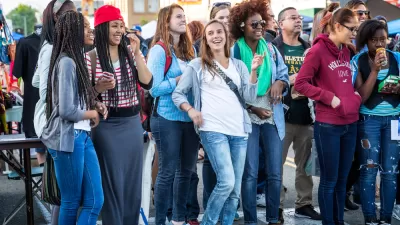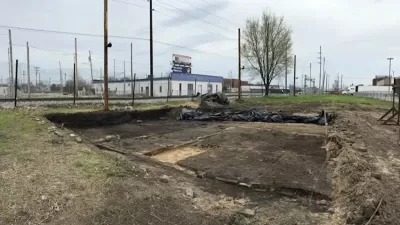Clare Foran unravels the relationship between misguided '70s-era planning efforts and ongoing racial tension in France.
A small town not far from the northern coast of France, Val-de-Reuil was established as one of nine New Towns intended to transform the overcrowding and suburban sprawl that plagued French cities in the late '60s and early '70s. Forty years on, however, it has yet to deliver on its promises.
"Today it’s one of the poorest cities in France," writes Foran, who formerly taught English there. "Rows of four and five-story, low-rent apartment complexes line the streets with balconies jutting out from their concrete facades... There is no discernible city center. The architecture of the buildings is modern, but not cutting edge and the city has a stark, uniform look to it. In a country that prides itself on history and tradition, Val-de-Reuil seems out of place – a town of boxy, geometric construction in the middle of the French countryside."
And while the reasons for its failure are worth considering (high unemployment due to industry-worker mismatch; a weak tax base due to socioeconomic segregation), more troubling is the way that such projects have reinforced racial tensions in a nation whose immigration policy is built on a platform of integration, "which calls for assimilation into French society, in speech, dress, culture, and custom."
"Val-de-Reuil isn’t a typical French town. To dismiss the city as an anomaly, however, would be a mistake. Val-de-Reuil embodies a central irony of French urban planning policy. City planners have built up isolated urban enclaves, like the Paris suburbs and the New Towns, which keep the country’s immigrant population separate from the rest of society, at the same time that the government calls for integration."
Foran recalls seeing these same tensions erupt in her own classroom, and hearing how minority children received them firsthand: "'You’re lucky that you live in the U.S.," [said one 12-year-old of Algerian descent]. 'Don’t you like living in France?' I asked. 'No,' he replied with grim certainty. 'People are racist here. They take one look and decide they don’t like you.'"
FULL STORY: How France Built Inequality Into Its Cities

Alabama: Trump Terminates Settlements for Black Communities Harmed By Raw Sewage
Trump deemed the landmark civil rights agreement “illegal DEI and environmental justice policy.”

Study: Maui’s Plan to Convert Vacation Rentals to Long-Term Housing Could Cause Nearly $1 Billion Economic Loss
The plan would reduce visitor accommodation by 25% resulting in 1,900 jobs lost.

Planetizen Federal Action Tracker
A weekly monitor of how Trump’s orders and actions are impacting planners and planning in America.

Waymo Gets Permission to Map SF’s Market Street
If allowed to operate on the traffic-restricted street, Waymo’s autonomous taxis would have a leg up over ride-hailing competitors — and counter the city’s efforts to grow bike and pedestrian on the thoroughfare.

Parklet Symposium Highlights the Success of Shared Spaces
Parklets got a boost during the Covid-19 pandemic, when the concept was translated to outdoor dining programs that offered restaurants a lifeline during the shutdown.

Federal Homelessness Agency Places Entire Staff on Leave
The U.S. Interagency Council on Homelessness is the only federal agency dedicated to preventing and ending homelessness.
Urban Design for Planners 1: Software Tools
This six-course series explores essential urban design concepts using open source software and equips planners with the tools they need to participate fully in the urban design process.
Planning for Universal Design
Learn the tools for implementing Universal Design in planning regulations.
Caltrans
Smith Gee Studio
Institute for Housing and Urban Development Studies (IHS)
City of Grandview
Harvard GSD Executive Education
Toledo-Lucas County Plan Commissions
Salt Lake City
NYU Wagner Graduate School of Public Service





























